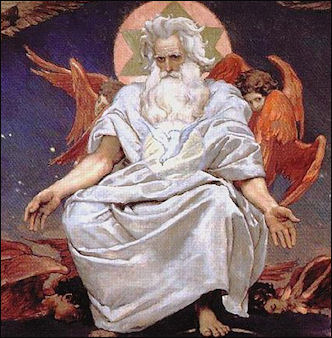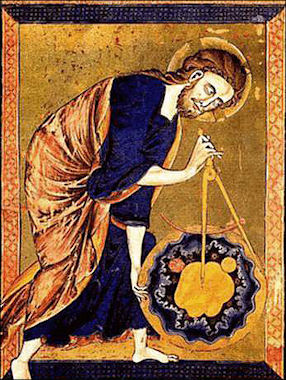Home | Category: Basic Christian Beliefs / God, Satan, Heaven and Hell
CHRISTIAN GOD

God In the West, the Jewish God is known as Jehovah. Jehovah is English for the Hebrew word Yahweh, which is more properly known as YHWH. The pronunciation of YHWH has been lost. It word is believed to mean "he who causes things to be" and in Biblical times was so holy that no one was allowed to say it except for the highest-level priests in important ceremonies.
The Jews did not attempt to pronounce YHWH. It was too holy. Instead they said “HaShem” , the “name.” The famous rabbi Haninina ben Teradion was reportedly tortured to death for uttering the "unutterable." The use of the word Lord to describe God came into usage in part so believers didn’t have to use the word God. The name Jehovah, coined in the Middle Ages, was not used in the Hebrew Bible.
The source of our information about God is the Old Testament, which is largely ascribed to Moses. In the early passages of the Old Testament, God is referred to by several names including El Shaddai, which some scholars say signifies a storm god or god of power, and El 'Elyon. In Exodus 3:14 he reveals his true name to be Yahweh (YHVH, Jehovah). El Shaddai means "God of the Mountain." El 'Elyon means "God Most High."
In classical texts God was regarded as unknowable: “Thou can not See My Face.” Until the Kabbalists came along Jews accepted that description and did not dwell much on the matter.
Geoffrey Parrinder wrote in “World Religions”, "The dilemma of the Hebrew is not the question whether God exists, or why he exists, but rather how he acts in the world, and what he requires of people. The natural world is a manifestation of God's glory...The God of the Bible is both a remote transcendent being, imposing his awe upon the universe, demanding absolute obedience...and also a loving and compassionate father, who has a close personal relationship with those who revere him." [“World Religions” edited by Geoffrey Parrinder, Facts on File Publications, New York]
Websites and Resources on Christianity BBC on Christianity bbc.co.uk/religion/religions/christianity ; Candida Moss at the Daily Beast Daily Beast Christian Answers christiananswers.net ; Christian Classics Ethereal Library www.ccel.org ; Sacred Texts website sacred-texts.com ; Internet Sourcebook sourcebooks.fordham.edu ; Christian Denominations: Holy See w2.vatican.va ; Catholic Online catholic.org ; Catholic Encyclopedia newadvent.org ; World Council of Churches, main world body for mainline Protestant churches oikoumene.org ; Online Orthodox Catechism published by the Russian Orthodox Church orthodoxeurope.org
RECOMMENDED BOOKS:
“God: A Biography” by Jack Miles Amazon.com ;
“The Reason for God: Belief in an Age of Skepticism” by Timothy Keller Amazon.com ;
“The Trinity: An Introduction” by Scott Swain Amazon.com ;
“Delighting in the Trinity: An Introduction to the Christian Faith” by Michael Reeves Amazon.com ;
“The Forgotten Trinity: Recovering the Heart of Christian Belief”
by James R. White, Claton Butcher, et al. Amazon.com ;
“The Jewish Approach to God: A Brief Introduction for Christians” by Rabbi Neil Gillman Amazon.com ;
“The Practice of the Presence of God” by Brother Lawrence Amazon.com
“The Golden Bough: A Study in Magic and Religion” by Sir James George Frazer. Amazon.com ;
“The Religions Book: Big Ideas Simply Explained (DK Big Ideas) Amazon.com ;
“12 Major World Religions: The Beliefs, Rituals, and Traditions of Humanity's Most Influential Faiths” by Jason Boyett Amazon.com
God Early in the Bible

God, the Architect At the beginning of the Hebrew Bible, after the Creation, God resembles a local pagan deity. The poet Stephen Mitchell described him as a "jealous, bungling, punitive god, not the god we can love with all our hearts and soul." In the Old Testament, God often displayed extreme bouts of anger whenever humanity disappointed him, especially by sinning with sex. In addition to wiping out entire nations of sinners, God also killed a lot of animals who had done nothing wrong. Many scenes involving God's anger have been edited out of the children's versions of the stories.
In his unorthodox introduction to the Bible, the bestselling British author Louis de Bernieres wrote: "There are many episodes in the Bible that show God in a very bad light...and one cannot but conclude from them either that God is a mad, bloodthirsty and capricious despot, or that all this time we have inadvertently worshipped the Devil."
Much of God’s anger is directed at people who continue to worship other Gods. After God sees the Israelites with the golden calf which they began worshipping while Moses was on Mt. Sinai, God says: "Now let me be, that my anger may blaze forth against them and I may destroy them, and make you a great nation." Over the course of the early Bible, God changes from a being that urges his followers to dash the heads of their enemies? babies on rocks to the god in Isaiah that tells them to love their enemies. In the beginning of the Old Testament, God is quite busy and present. He shows up at the Garden of Eden, speaks to Abraham and Moses and even wrestles around with Jacob. As the Bible progresses he appears and speaks less and less until he virtually disappears.
In the New Testament God is regarded as beyond description. According to John 4:12: “No one has ever seen God.”
Christian Beliefs About God, Jesus and the Holy Ghost
According to the BBC: “Christian beliefs concerning God: 1) There is only one God; 2) God is a Trinity of Father, Son and Holy Spirit; 3) God is perfect; 4) God is omnipotent; 5) God is everywhere; 6) God knows everything; 7) God created the universe; 8) God keeps the universe going; 9) God intervenes in the universe; 10 ) God loves everyone unconditionally (though people have to comply with various conditions in order to achieve salvation); 11) Human beings can get to know God through prayer, worship, love, and mystical experiences; 12) Human beings can get to know God through God's grace - that is through his love and his power |::|

In Christian art the Holy Spirit is often by a glowing dove
God the Son: 1) God lived on earth as Jesus; 2) Jesus was both wholly God and wholly human Jesus was born to a human woman, Mary, but conceived of the Holy Spirit; 3) Because Jesus was wholly human he was subject to pain, suffering, and sorrow like other human beings; 4) Jesus was executed by crucifixion but rose from the dead at the Resurrection; 5) Jesus's life provides a perfect example of how God wants people to live; 6) Jesus died on the Cross so that those who believe in him will be forgiven all their sins
God the Holy Spirit 1) After the Resurrection, Jesus remained on earth for only a few days before going up into Heaven Jesus promised that he would stay with his followers, so after he went to Heaven he sent his Spirit to guide them The Holy Spirit continues to guide, comfort, and encourage Christians |::|
Holy Ghost (Holy Spirit)
Christians believe that after Jesus’s Ascension to heaven, God entered the church as the Holy Spirit and has stayed there ever since. The Acts of the Apostles describes the arrival of Holy Spirit at a meeting of the disciples: “Suddenly there came from heaven a sound as if it where a violent wind...and there appeared to them tongues as of fire, these separated and came to rest on the head of each of them.” The Holy Spirit gave the disciples the ability to speak a number of different languages, allowing them to spread the words of God and Jesus, and thus ushering in the Christian era. This is regarded as the day of the inception of the Christian church.
The Holy Spirit was introduced in the early Christian era. It did not exist in the religion of the Jews. It was articulated by Paul as spirit of god left behind by Christ and something that Christiana instinctively tune into and follow in living an ordinary, dutiful Christian life.
The Trinity
While Christianity is monotheistic, it also holds the concept that the single, eternal God is composed of the Father, the Son, and the Holy Spirit. This three-in-one concept of God was the source of great debate in early centuries of Christianity. [Source: Encyclopedia.com]
Christians believe that God manifests himself through the Holy Trinity: Father (God), Son (Jesus Christ) and the Holy Ghost (or Holy Spirit). Resolving the Holy Trinity with the doctrine of monotheism took centuries and tricky metaphysical maneuvering to work out and was a divisive issue in the early days of Christianity and remains something that many ordinary people can’t comprehend.
Through the concept of the Holy Trinity the Father (God) remains something that exist outside of our world in a kind of parallel universe, while Jesus was a divine man who came to earth and departed and the Holy Ghost is a facade of God that remains with us in the world, in our universe.

he Trinity: Father (right), son (left) and Holy Ghost (top)
According to the BBC: “A difficult but fundamental concept within Christianity, the Trinity is the belief that God is three separate persons but is still a single God. Christianity adopted this complicated idea of God because it was the only way they could make sense of One God in the context of the events and teaching of the Bible. The idea of the Trinity does not supersede monotheism; it interprets it, in the light of a specific set of revelatory events and experiences. [Source: BBC, July 21, 2011 |::|]
“The core belief : The doctrine of the Trinity is the Christian belief that: There is One God, who is Father, Son, and Holy Spirit. Other ways of referring to the Trinity are the Triune God and the Three-in-One. The Trinity is a controversial doctrine; many Christians admit they don't understand it, while many more Christians don't understand it but think they do. [Source: BBC, July 21, 2011 |::|]
“In fact, although they'd be horrified to hear it, many Christians sometimes behave as if they believe in three Gods and at other times as if they believe in one. Trinity Sunday, which falls on the first Sunday after Pentecost, is one of the few feasts in the Christian calendar that celebrate a doctrine rather than an event. |::|
See Separate Article: THE HOLY TRINITY europe.factsanddetails.com
Image Sources: Wikimedia Commons except Modalism chart from Expository Thought
Text Sources: Internet Sourcebook sourcebooks.fordham.edu ; “World Religions” edited by Geoffrey Parrinder (Facts on File); “ Encyclopedia of the World’s Religions” edited by R.C. Zaehner (Barnes & Noble Books, 1959); King James Version of the Bible, gutenberg.org; New International Version (NIV) of The Bible, biblegateway.com; Christian Classics Ethereal Library (CCEL) ccel.org , Frontline, PBS, Wikipedia, BBC, National Geographic, New York Times, Washington Post, Los Angeles Times, Smithsonian magazine, The New Yorker, Time, Live Science, Encyclopedia.com, Archaeology magazine, Reuters, Associated Press, Business Insider, AFP, Library of Congress, Lonely Planet Guides, Compton’s Encyclopedia and various books and other publications.
Last updated March 2024
